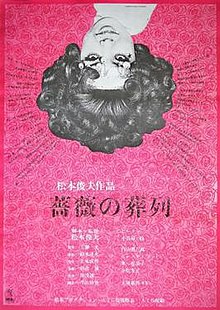Funeral Parade of Roses
| Funeral Parade of Roses | |
|---|---|
 Japanese film poster | |
| Directed by | Toshio Matsumoto |
| Written by | Toshio Matsumoto |
| Produced by |
|
| Starring |
|
| Cinematography | Tatsuo Suzuki |
| Edited by | Toshie Iwasa |
| Music by | Joji Yuasa |
| Distributed by | Art Theatre Guild |
Release date |
|
Running time | 105 minutes |
| Country | Japan |
| Language | Japanese |
Funeral Parade of Roses (薔薇の葬列, Bara no Sōretsu) is a 1969 Japanese drama film directed and written by Toshio Matsumoto, loosely adapted from Oedipus Rex and set in the underground gay culture of 1960s Tokyo. It stars Peter as the protagonist, a young transgender woman, and features Osamu Ogasawara, Yoshio Tsuchiya and Emiko Azuma. A product of the Japanese New Wave, the film combines elements of arthouse, documentary and experimental cinema, and is thought to have influenced Stanley Kubrick's film adaptation of Anthony Burgess' novel A Clockwork Orange (1971).[1]
The title is a pun, as "rose" (bara) in Japanese can have a similar meaning to "pansy" in English slang.[2]
The film was released by A.T.G. (Art Theatre Guild) on September 13, 1969 in Japan; however, it did not receive a United States release until October 29, 1970. Matsumoto's previous film For My Crushed Right Eye contains some of the same footage and could be interpreted as a trailer for Funeral Parade. In June 2017, it received a 4K restoration and a limited theatrical rerelease.[3] In 2020, it received a limited edition Blu-ray release from the British Film Institute in the UK.[4]
Plot[]
The film follows the trials and tribulations of Eddie and other transgender women in Tokyo.[5] The main plot continuously jumps around the timeline of events to hint at and hide the major twist. The film also contains shots in a documentary style interviewing cast members about their sexuality and gender identity, as well as pieces of avant-garde film of Guevara's creation.
Cast[]
- Peter as Eddie
- Osamu Ogasawara as Leda
- Yoshio Tsuchiya as Gonda
- Emiko Azuma as Eddie's mother
- Toyosaburo Uchiyama as Guevara
- Don Madrid as Tony
- Koichi Nakamura as Juju
- Chieko Kobayashi as Okei
- Shōtarō Akiyama as himself
- Kiyoshi Awazu as himself
Production[]
The film was set and shot in Tokyo.
References[]
- ^ ‘Funeral Parade of Roses’: Edgy 1969 Japanese drama that inspired Kubrick’s ‘A Clockwork Orange’ Dangerous Minds, 15 June 2016. Retrieved 13 August 2020.
- ^ "Exclusive - Fantagraphics to publish 'Massive' anthology of gay manga". 31 December 2013. Retrieved 13 April 2017.
- ^ "'Funeral Parade of Roses' Review: New 4K Restoration is Still Erotically Charged". . 14 June 2017. Retrieved 23 June 2021.
- ^ Funeral Parade of Roses (2-Disc Blu-ray)
- ^ Cleary, Tamsin (16 June 2020). "Why Funeral Parade of Roses is a landmark of Japanese queer cinema". British Film Institute. Retrieved 6 May 2021.
- Sources
- (in Japanese) 薔薇の葬列 (Bara no Sōretsu) at the Japanese Movie Database
- "Eros Effect" review by Lucid Screening
- Sharp, Jasper (26 September 2006). "Funeral Parade of Roses (Review)". Midnight Eye. Retrieved 18 October 2007.
- Thompson, Nathaniel (2006). DVD Delirium: The International Guide to Weird and Wonderful Films on DVD; Volume 3. Godalming, England: FAB Press. pp. 250–251. ISBN 1-903254-40-X.
- "Timeline for a Timeless Story" essay by Jim O'Rourke
External links[]
- Funeral Parade of Roses at IMDb
- Funeral Parade of Roses is available for free download at the Internet Archive
- 1969 films
- Japanese-language films
- 1969 drama films
- 1969 LGBT-related films
- Japanese films
- Japanese drama films
- Japanese LGBT-related films
- Films based on works by Sophocles
- Films directed by Toshio Matsumoto
- Japanese avant-garde and experimental films
- Japanese black-and-white films
- Films set in Tokyo
- Films shot in Tokyo
- Films about trans women
- LGBT-related drama films
- Works based on Oedipus Rex
- Modern adaptations of works by Sophocles
- 1960s Japanese film stubs
- LGBT-related drama film stubs